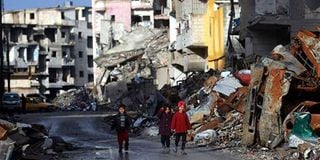Fast facts about Islamic State

Syrian children walk along a destroyed street in Raqa, the former de facto capital of the Islamic State (IS) group, on February 18, 2018. PHOTO | DELIL SOULEIMAN | AFP
What you need to know:
- Islamic State started as a splinter group from Al-Qaeda in 2006.
It has partners and networks in Somalia, Saudi Arabia, Turkey, and most recently in the Philippines.
Between 2005 and 2015, fighting in Syria, Iraq and Yemen displaced 18 million people.
A Kenyan woman has been listed by the United States as one of seven people in the world who finance who finance the Islamic State in Iraq and Syria. But what is the Islamic states?
Here are some fast facts about the violent Islamic movement.
- Started as a splinter organisation from Al-Qaeda in 2006.
Isis is also known as the Islamic State of Iraq and the Levant (ISIL), Daesh (one who tramples down or sows discord), ad-Dawlah al-Islāmiyah, (Islamic State)
It has partners and networks in Somalia, Saudi Arabia, Turkey, and most recently the Philippines where Abu Sayyaf millitant group fighters have joined its ranks.
Isis aims to establish an Islamic state or a caliphate in Iraq, Syria and other nations in the Middle East.
It rules through Sharia Law, based strictly on applying tenets in the Quran.
By 2014, Isis controlled more than 34,000 square miles in Syria and Iraq, from the mediterranean coast to south of Baghdad. By the beginning of 2016, the US estimated that the group had lost up to 40 percent of its territory across Syria and Iraq.
Between 2005 and 2015, fighting in Syria, Iraq and Yemen displaced 18 million people, bringing the total number of displaced migrants in the Middle East to around 23 million.
Isis also keeps a large number of prisoners as slaves. A UN report estimates that 3,500 women and children are currently held captive.
Isis finances its operations through extortion, ransom paid for kidnappings, selling stolen works of art, controlling the cultivation of crops in its territories, smuggling and taxes.
According to the Geneva Centre for Security Policy, the bulk of this money comes from the 8 million civilians who live and work in territory taken over by Isis soldiers.
Income tax: 10 per cent, Business taxes:10 to 15 per cent. Sales tax: 2 per cent, Tax on bank cash withdrawals; 5 per cent. Pharmaceutical drugs: 10 to 35 per cent of total revenue
Schoolchildren must pay $22 for elementary students and $43 for secondary school students. University students pay $65, according to congressional researchers.
Soldiers usually earn between Sh40, 544 to Sh121, 632 monthly. In addition their wives get a Sh5, 068 allowance each while every child is eligible for Sh 2,534.
Highly skilled technicians and engineers can earn up to $1,500 a month.





